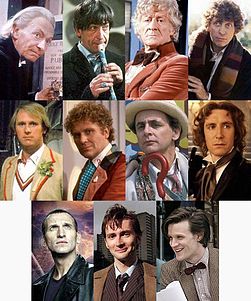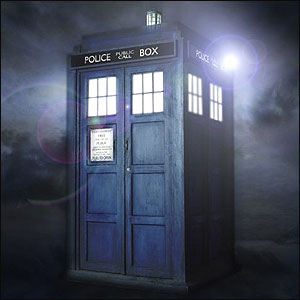Doctor Who

General
Doctor Who is a British science fiction television programme produced by the BBC. The programme depicts the adventures of a Time Lord time travelling, humanoid alien with two hearts known as the Doctor. He explores the universe in his 'TARDIS', a sentient, telepathic time-and-space-travel machine that flies through the time vortex. Its exterior appears as a blue British police box, a common sight in Britain in 1963, when the series first aired. Along with a succession of companions, the Doctor faces a variety of foes while working to save civilisations, help ordinary people, and right wrongs.

The Doctor
The character of the Doctor was initially shrouded in mystery. All that was known about him in the programme's early days was that he was an eccentric alien traveller of great intelligence who battled injustice while exploring time and space in an unreliable time machine, the "TARDIS", (an acronym for Time And Relative Dimension(s) In Space), which appears much larger on the inside than on the outside. The initially irascible and slightly sinister Doctor quickly mellowed into a more compassionate figure. It was eventually revealed that he had been on the run from his own people, the Time Lords of the planet Gallifrey.

Changes of appearance
As a Time Lord, the Doctor has the ability to regenerate his body when near death. Introduced into the storyline as a way of continuing the series when the writers were faced with the departure of lead actor William Hartnell in 1966, it has continued to be a major element of the series, allowing for the recasting of the lead actor when the need arises. The serials The Deadly Assassin and Mawdryn Undead and the 1996 TV film suggest that a Time Lord can regenerate 12 times, for a total of 13 incarnations. Death of the Doctor, a 2010 episode of the spin-off series The Sarah Jane Adventures, has the Doctor claiming that he can regenerate 507 times, but episode writer Russell T Davies later indicated that this was intended as a joke, not to be taken seriously.[52]
The Doctor has fully gone through this process and its resulting after-effects on ten occasions, with each of his incarnations having their own quirks and abilities but otherwise sharing the consciousness, memories, experience and basic personality of the previous incarnations.

Ravelations
Throughout the programme's long history, there have been revelations about the Doctor that have raised additional questions. In The Brain of Morbius (1976), it was hinted that the First Doctor may not have been the first incarnation (although the other faces depicted may have been incarnations of the Time Lord Morbius). In subsequent stories the First Doctor was depicted as the earliest incarnation of the Doctor. In Mawdryn Undead (1983), the Fifth Doctor explicitly confirmed that he was currently in his fifth incarnation.
During the Seventh Doctor's era, it was hinted that the Doctor was more than just an ordinary Time Lord. In the 1996 television film, the Eighth Doctor describes himself as being "half human".[60] The BBC's FAQ for the programme notes that "purists tend to disregard this",[61] instead focusing on his Gallifreyan heritage.
The programme's first serial, An Unearthly Child, shows that the Doctor has a granddaughter, Susan Foreman. The 2005 series reveals that the Ninth Doctor thought he was the last surviving Time Lord, and that his home planet had been destroyed; in "The Empty Child" (2005), Constantine makes a statement that "before this war began, I was a father and a grandfather. Now I am neither." The Doctor remarks in response, "Yeah, I know the feeling." In both "Fear Her" (2006) and "The Doctor's Daughter" (2008), he states that he had, in the past, been a father.
In "The Wedding of River Song" (2011), it is stated that the Doctor's true name is a secret that must never be revealed.

Episodes
Doctor Who originally ran for 26 series on BBC One, from 23 November 1963 until 6 December 1989. During the original run, each weekly episode formed part of a story (or "serial") — usually of four to six parts in earlier years and three to four in later years. Notable exceptions were: The Daleks' Master Plan, which aired in 12 episodes (plus an earlier one-episode teaser;[34] "Mission to the Unknown", featuring none of the regular cast;[35] almost an entire series of 7-episode serials (series 7); the 10-episode serial The War Games;[36] and The Trial of a Time Lord, which ran for 14 episodes (albeit divided into three production codes and four narrative segments) during Series 23.[37] Occasionally serials were loosely connected by a storyline, such as Series 8 being devoted to the Doctor battling a rogue Time Lord called The Master, Series 16's quest for The Key to Time, Series 18's journey through E-Space and the theme of entropy, and Series 20's Black Guardian Trilogy.





